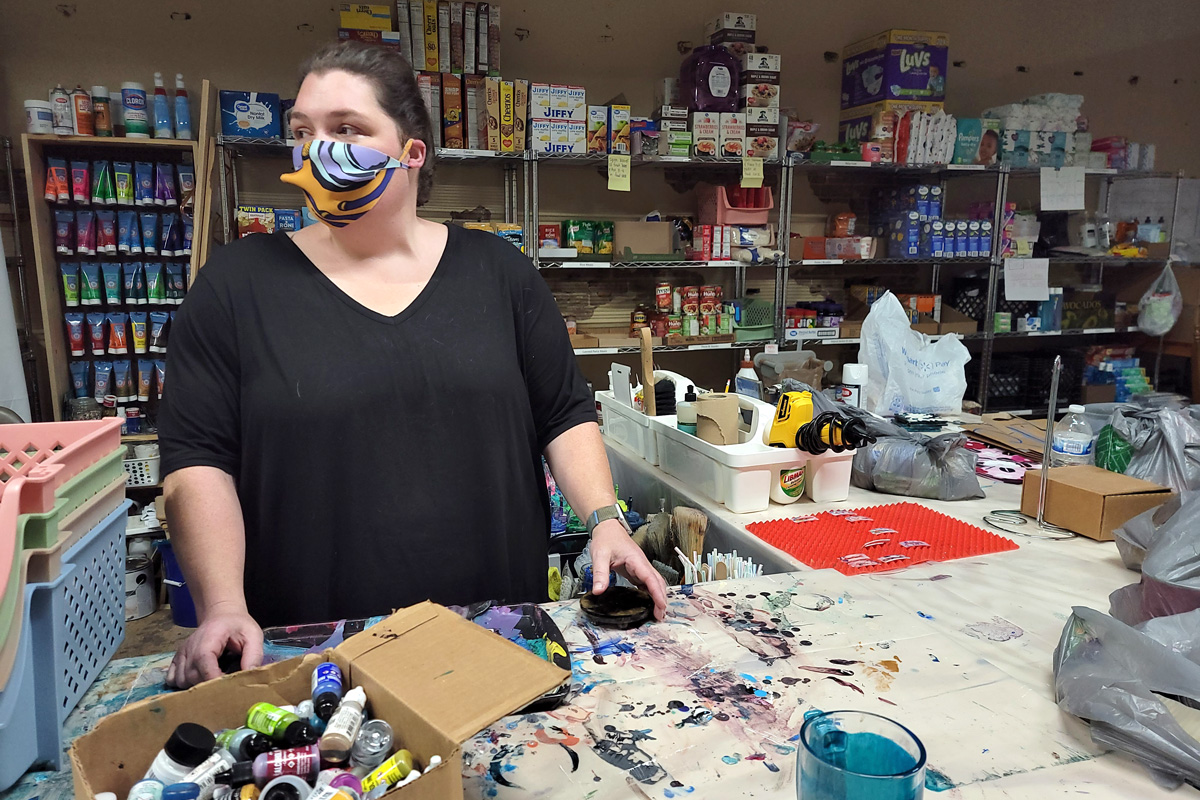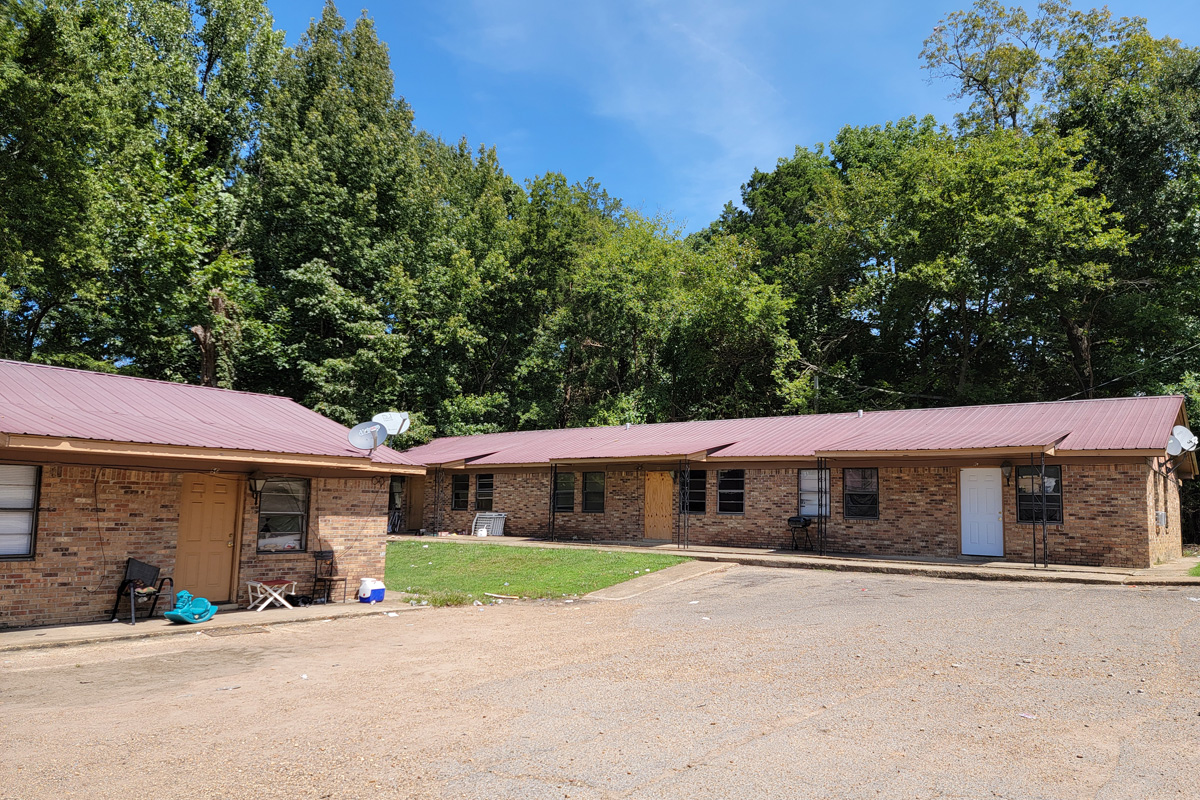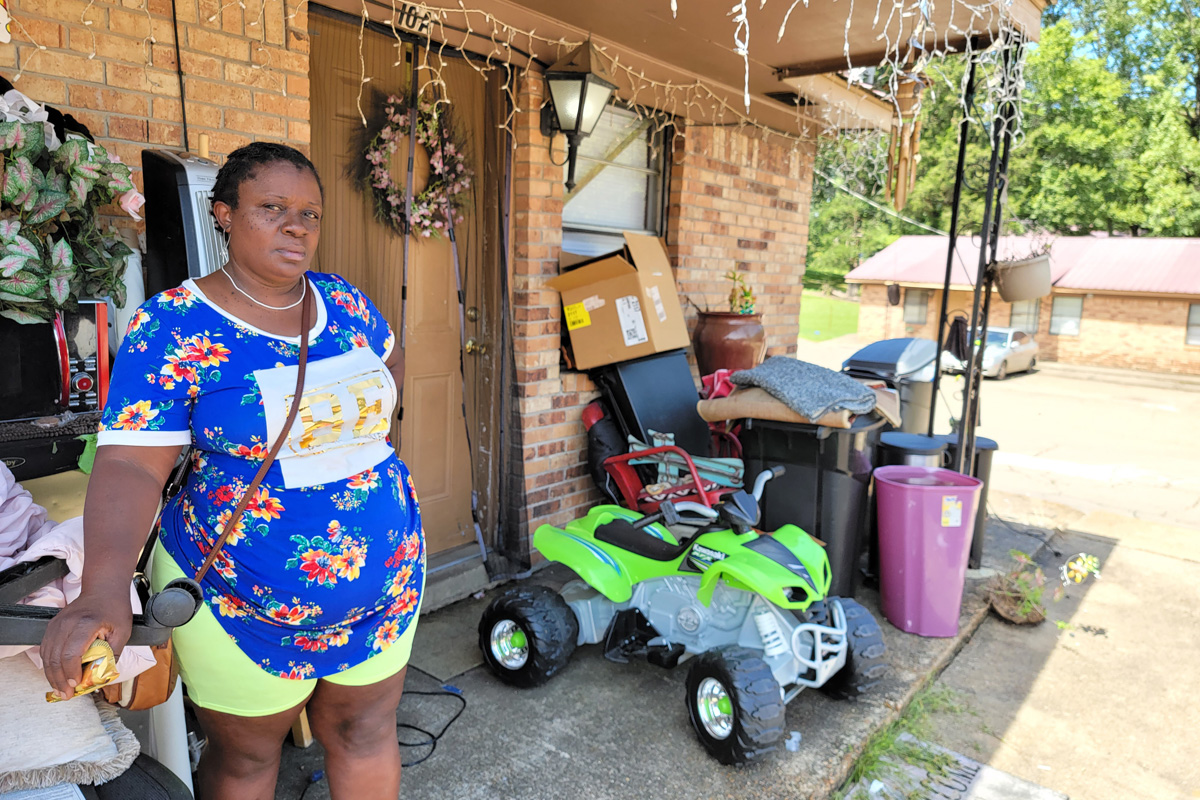STARKVILLE, Miss.—Elecia Brooks is halfway out of Catherine Street Apartments. One look at her porch reveals a life in rapid transition, piled up under the string of lights adorning her roof. Time is finally on her side. She has found a place to put all of her belongings, another apartment that will take her when Catherine Street is shuttered in the coming months. It wasn’t easy.
“I had to hunt this man down for that apartment over there,” she told the Mississippi Free Press on Wednesday in Starkville. “I was going to get another one, but then COVID came, so….” She waves her hand, like something evaporating into thin air.
Everything at Catherine Street feels ephemeral these days. Most of the residents are surprised to even still be there since a Friday in late August when representatives from Ferretti Property Services—accompanied by the Starkville Police Department—allegedly went apartment to apartment, hammering on the doors, giving dwellers hours to vacate.
The intercession of local activists from Starkville Strong, the Oktibbeha County NAACP and the personal appearance of Starkville Mayor Lynn Spruill extended that deadline to the following Monday, a short notice that left residents dumped right into the path of a growing Hurricane Ida. A hail-mary legal injunction through the Oktibbeha County Chancery Court pushed the eviction back another nine days, awaiting a court hearing that took place this Wednesday, Sept. 8.
At that hearing, the occupants of the Catherine Street Apartments in Starkville won one last reprieve from eviction—nine more days for some—a brief stay that activists and residents alike hope will provide them with the time to find somewhere new to live.
The time was just what Brooks needed. On the way back from her apartment, she points to a car driving past, grinning. “There goes my niece right there,” she says. “She’s got five kids.” With her own life after Catherine Street Apartments mostly sorted out, most of Brooks’ concern is for her extended family living in other units in the complex.
That momentary security is a hard-won prize. If she had been forced out the day Ferretti’s representative had pounded on her front door, she would have been out on the streets, she told the Mississippi Free Press.
‘Favorable to Both Sides’
No grand courtroom drama preceded the extension of the residents’ time at Catherine Street. Starkville attorney Austin Vollor stepped outside the heavily attended Oktibbeha County Chancery Court to confer with Feretti Property Services’ legal representatives from Butler Snow, one of the state’s most powerful law firms, based in the suburbs just north of Jackson.
When the parties returned to the courtroom, Judge Joseph Studdard announced a conclusion to the deliberations intended to satisfy both the landlord and the tenants. Ferretti wanted the residents out so that the entire property could be rehabilitated, and Vollor’s clients, just under two dozen of the residents at the apartment complex, mostly just wanted time to find somewhere else to live.
“We have been able to resolve this matter in a manner that is favorable to both sides,” Studdard announced, before asking the media to leave. Outside the courthouse, Vollor summarized the conclusion.

“There was an agreement for an extension. We broke (residents) up into separate classes. What we refer to as round one, for those cases (who had a court hearing) on Aug. 18, those have been given nine more days on top of the nine days that were already given to get out of their housing,” Vollor said.
The judge gave other residents who participated in the lawsuit until the end of September to vacate the premises. One much smaller group with demonstrated health issues will have additional time in October to find a new place to live, and curiously, for now two residents will not be evicted at all.
Last week’s temporary injunction in effect barred Ferretti Property Services from evicting any residents at Catherine Street Apartments at all. With that injunction now ended, it is unclear if residents who did not participate in the court case are subject to the same delay in the upcoming evictions. Vollor could not comment on residents who he did not specifically represent.
But today Vollor did confirm that the formal eviction notice was on its way to the residents of the apartment complex. This notice is important to residents and activists alike. Without the eviction notice, many of the rental-assistance programs intended to help residents like those being evicted from Catherine Street Apartments are inaccessible.
“That was one of the main things that we were concerned about,” Vollor said Wednesday. “There was never an eviction handed down from justice court. And so they were trapped. They couldn’t go and get the assistance they needed because they didn’t have the order from the justice court. Now we’re going to be able to give them an order that allows them to get the assistance they need.”
Narrow Definition of Homelessness
In the back of an art and jewelry store in the center of Starkville, Cate Van Halsema, Starkville Strong’s secretary, cannot hide her relief. “This was the best outcome that we could get,” she told the Mississippi Free Press in the space serving as a workshop, food bank and headquarters of the community-service organization. She admitted to a rising panic ahead of the court date, terrified that if the case was thrown out the worst-case scenario could have dozens of residents on the street before they could find somewhere else to live.
Starkville Strong’s work has only just begun. The attention from the mass evictions and the efforts of groups like the Oktibbeha County NAACP and Mississippi United To End Homelesness have provided them with much of the financial assistance necessary to help some of the residents of Catherine Street Apartments find somewhere new to live, but money is not the only issue. Many residents have difficulty simply being approved for a new apartment, even if they have money to cover their deposit and first month of rent.
Van Halsema explained that the work ahead was highly personal, the challenge of developing relationships to undergird a more permanent living space for the residents evicted from Catherine Street. “We’re doing our very best to make personal connections with landlords. In addition to following the normal procedure of filling out an application and things like that. We’re also trying to help tenants be strategic about where to apply,” she said.

With limited time and money, residents are forced to be selective about where they look. A town like Starkville provides them with few good options. “If a property has specific requirements in terms of credit, background checks or whatever that we know that a tenant may not meet, rather than having them pay for an application fee and then get denied, we’re trying to help steer them in the (right) direction,” she added.
Some residents, like Elecia Brooks, have a runway ahead of them. But Starkville Strong doesn’t represent every resident from the apartment complex and certainly not every unhoused resident of the college town, the home of Mississippi State University. For the many without direct assistance, the gaps in the social safety net are miles wide.
“Unfortunately,” Van Halsema said, “many of the people who are homeless in Starkville—meaning they don’t have an actual residence or domicile that is their own—don’t qualify for assistance because they don’t match the narrow government definition of homelessness.”
Starkville Strong’s study of the city’s unhoused population revealed that 60% were currently couch-surfing, without a home of their own but living in temporary, unpaid arrangements. These temporary solutions, Van Halsema said, put evicted and unhoused residents in a catch-22. Staying on a friend’s couch is a more appealing option than sleeping in a car or on the streets, but as it fails to meet the official definitions of “homelessness,” it means that the person cannot receive the support that they may need to get back on their feet and in a home of their own.
And the pandemic has been disastrous for Starkville’s at-risk population. Currently, Starkville Strong is tracking 184 cases of “at-risk” households and 82 individuals actively experiencing homelessness. Both of those numbers have grown massively since the beginning of 2020.
Back in his office, Vollor was contemplative, glasses propped up by a tuft of wiry, gray-brown hair. Like Blake Ferretti, the man whose company ordered the sudden evictions, like Mayor Lynn Spruill, herself a powerful property owner in the Starkville area, Vollor comes from a very different background than the residents of Catherine Street Apartments.
“Look,” he said, striking his desk with the edge of his hand. “I’m a landlord, too. This is not how we act. That was another layer of why I took offense to this. In my view this isn’t how it’s done.”
Vollor seemed muted by the fact that however meaningful the day’s victory was, the local mass evictions are only one chapter in a much longer story. Starkville, and many other towns just like it, continue to develop housing markets that price out residents who have been in the city limits for years. Where “affordable” housing remains, years of neglect and decay on the part of property owners often result in appalling living conditions, the kind the residents of Catherine Street have grown used to.
“I think community leadership—our elected officials—need to take notice and do things like review ordinances and restrictions on the type of housing we have in this community,” Vollor said. “What requirements are we going to put on housing for lower income individuals, families, disabled folks, you know? You don’t have to over-regulate, but you do have to add a human aspect to this thing to make sure that (conditions) don’t fall to the point that people have maggots falling off their ceilings.”
“I’m looking right up the hill at the city leadership. We’re a small community. It’s not like these people can go unseen. They’re there. We all see them. We see these houses, we see these apartment complexes. We know where they are. We know who they are, and I think it’s incumbent upon our elected officials to take notice, make some changes, put some programs in place. Put a safety net out for those with the least among us to protect them because they’re valuable to this community too.”
‘We’re Ready To Get On’
Back at Catherine Street Apartments, residents find themselves in an excruciating position. Virtually none of them want to stay at the crumbling apartment complex, even the ones who had called it home for years. But for many, countless responsibilities leave them tied to a small geographic area.
Kissy Lucious—pronounced Kizzy—lives with her husband and four children at Catherine Street Apartments. She walks to work at a hotel in the area and takes her kids to schools nearby. The apartment she lives in is in desperate need of repair, but the biggest risk for her is what might happen if she loses her job, or what it would mean to pull her oldest son out of school.
“That’s why I didn’t want to leave. He’s in the 12th grade,” she told the Mississippi Free Press.
“I don’t have a vehicle,” she said. “I work in Starkville. I just can’t go through a whole ‘nother town.” Affordable housing is a fantasy in a place like Starkville, especially for someone like Lucious, who has to provide for a family. “Right now I’m looking at a house with three bedrooms, and it’s $900 a month. That’s twice what we were originally paying here.”

The residents of Catherine Street Apartments are angry that Ferretti Property Services apparently chose to purchase the apartment complex and decided to throw almost all of its residents out without so much as a conversation.
Ferretti Property Services declined an interview for this story, sending out a statement in lieu of a discussion with the media. “Ferretti Property Services, LLC is pleased with the outcome of the recent proceedings in Oktibbeha County Chancery Court. Our goal is to provide an affordable, safe, and clean environment for families. In March, we began managing the Catherine Street Apartments in Starkville. Since then, it has become clear that some of the current residents do not share our goals,” the statement said.
“While we were certainly well within our legal rights and this settlement is clearly not an admission of any wrongdoing, it clears the way for us to continue to provide much needed, affordable housing for residents of Starkville.”
It is difficult to parse how the residents of Catherine Street Apartments failed to share Ferretti’s “goals.” Lucious—and other residents of the apartment complex that the Mississippi Free Press interviewed for this story—said there had been no dialogue between Ferretti Property Services and the residents, no attempts to negotiate new leases, no attempts to warn them that they intended to evict virtually every resident on the premises.
“They won’t even answer the phone for us,” Lucious said. Dianndra Gay, another resident, said the extent of the communication was a sheet of paper telling them where to send their rent money.
“They just put a note on our door to tell us where to pay rent. Every time we’d see the maintenance man, when we asked him, he said to give them a call,” Gay continued. “But when we called they never answered.”
The residents of Catherine Street Apartments have one last fading moment to find a place to stay, a place that they hope will keep them sheltered for longer than Ferretti’s brief ownership of where they live now. Without a change in the legal ways that housing is developed and managed in Starkville, and in America more broadly, many of them may remain on the periphery, working full-time jobs to support their families without the guarantee of secure housing or the freedom to build the kind of community that more privileged people can afford.
Back in front of their apartment, Brooks is smiling, happy to be with her niece and her daughter Lisa, even with an uncertain future ahead of them. Lisa has kids of her own, and as of Wednesday, was still looking to secure housing after Catherine Street. A formal eviction order will help with the financial assistance they need to make their next step a reality.
“We’re ready to get on,” Lisa said.






